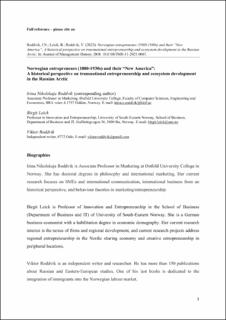| dc.contributor.author | Roddvik, Irina Nikolskaja | |
| dc.contributor.author | Leick, Birgit | |
| dc.contributor.author | Roddvik, Viktor | |
| dc.date.accessioned | 2022-06-07T09:56:43Z | |
| dc.date.available | 2022-06-07T09:56:43Z | |
| dc.date.created | 2022-04-14T09:55:09Z | |
| dc.date.issued | 2022 | |
| dc.identifier.citation | Journal of Management History. 2022. | en_US |
| dc.identifier.issn | 1751-1348 | |
| dc.identifier.uri | https://hdl.handle.net/11250/2997648 | |
| dc.description.abstract | Structured abstract Purpose The paper presents a historical case study of Norwegian transnational entrepreneurs (1880-1930s) and the ecosystems that they founded in Russia’s Arctic periphery. Drawing from the contemporary transnational entrepreneurship and entrepreneurial ecosystem literature, and inspired by AnnaLee Saxenian’s concept of “brain circulation”, we explore the journey and impact of these entrepreneurs in a time of evolving political turbulence. Design/methodology/approach We apply a mixed-methodology approach, drawing from nine qualitative interviews held in 2021 and secondary material, including historical books, a podcast, videos, and archival data. Findings The Norwegian entrepreneurs were both “pulled” by and “pushed” to the Russian region, their “New America”, where they could apply their personal skills and exploit their rich social and financial capital in order to establish a local entrepreneurial ecosystem. However, radical political change altered the context, which led many of the entrepreneurs to re-migrate to Norway. Originality The paper presents an original, novel case study on the historical role of transnational entrepreneurs across different cultural settings, their impact on a foreign peripheral location, including social-network building, and evolving political change in the historical context. The findings are relevant for contemporary management literature. Research limitations/implications The paper demonstrates the role of the political context for contemporary entrepreneurship and management research, as transnational entrepreneurs and international expatriates remain vulnerable to political change. Practical implications Public-policy actors and managers in companies need to support highly-skilled transnational entrepreneurs, including expatriates, in a setting with turbulence, crisis, and even war, in order to foster the sustainable contribution of entrepreneurial migrants to regional economic development across different countries. Keywords Transnational entrepreneurship, brain circulation, industry development, social-community building, social capital, entrepreneurial ecosystem, foreign business, cross-border entrepreneurship, historical case study. | en_US |
| dc.language.iso | eng | en_US |
| dc.publisher | Emerald Publishing Limited | en_US |
| dc.subject | Internasjonalt Entreprenørskap | en_US |
| dc.subject | International Entrepreneurship | en_US |
| dc.subject | Innvandrerentreprenørskap | en_US |
| dc.subject | Immigrant entrepreneurship | en_US |
| dc.subject | Regional utvikling | en_US |
| dc.subject | Regional development | en_US |
| dc.subject | transnational entrepreneurship | en_US |
| dc.subject | brain circulation | en_US |
| dc.subject | industry development | en_US |
| dc.subject | social-community building | en_US |
| dc.subject | social capital | en_US |
| dc.subject | entrepreneurial ecosystem | en_US |
| dc.subject | foreign business | en_US |
| dc.subject | cross-border entrepreneurship | en_US |
| dc.subject | historical case study | en_US |
| dc.title | Norwegian entrepreneurs (1880-1930s) and their “new America”: a historical perspective on transnational entrepreneurship and ecosystem development in the Russian Arctic | en_US |
| dc.type | Peer reviewed | en_US |
| dc.type | Journal article | en_US |
| dc.description.version | acceptedVersion | en_US |
| dc.rights.holder | © 2020, Emerald Publishing Limited | en_US |
| dc.subject.nsi | VDP::Bedriftsøkonomi: 213 | en_US |
| dc.subject.nsi | VDP::Business: 213 | en_US |
| dc.source.journal | Journal of Management History | en_US |
| dc.identifier.doi | 10.1108/JMH-11-2021-0067 | |
| dc.identifier.cristin | 2017291 | |
| cristin.ispublished | true | |
| cristin.fulltext | postprint | |
| cristin.qualitycode | 1 | |
